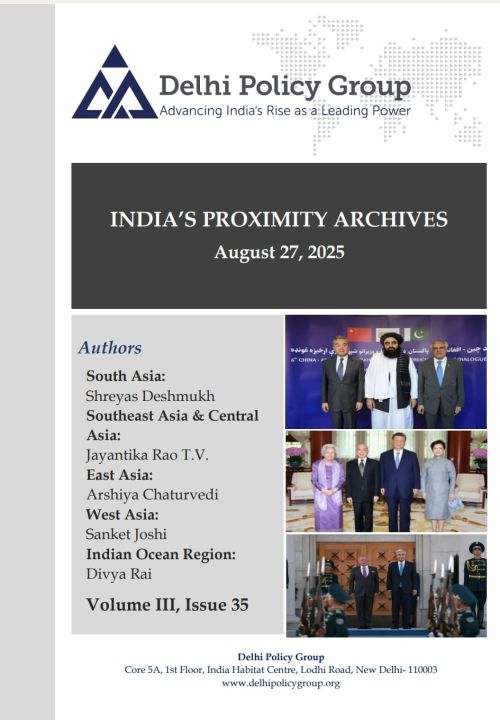India's Proximity Archives
South Asia
The Sixth Trilateral Foreign Ministers’ Dialogue between China, Afghanistan, and Pakistan took place in Kabul on August 20. In a meeting with Taliban’s counterpart Muttaqi, Foreign Minister Ishaq Dar voiced his dissatisfaction regarding the Taliban’s counter-terrorism initiatives against TTP. Wang Yi indicated China’s willingness to promote this trilateral relationship, offering support to Afghanistan and Pakistan for improved their bilateral relations. The Taliban Foreign Ministry stated that Beijing expressed interest in exploring and mining minerals in Afghanistan and sought Kabul’s formal participation in its Belt and Road Initiative. Following his arrival from Kabul on August 21st, Wag Yi attended the Sixth Round of the China-Pakistan Foreign Ministers’ Strategic Dialogue in Islamabad, where he affirmed that China would continue to give precedence to Pakistan within its neighbourhood diplomacy and was prepared to develop an advanced iteration of the China-Pakistan Economic Corridor (CPEC).
Southeast Asia
On August 26, Chinese President Xi Jinping and his wife Peng Liyuan met with Cambodian King Norodom Sihamoni and Queen Mother Norodom Monineath Sihanouk in Beijing on the sidelines of the 80th Anniversary of the Victory of the Chinese People’s War of Resistance Against Japanese Aggression. During the meeting, President Xi stated, “China-Cambodia relations have withstood the test of the shifting international landscape, and the two countries have forged an ironclad friendship featuring mutual assistance in trying times. The relationship has become a valuable asset for the two peoples and should be held dear by both sides”.
East Asia
On August 24, Chinese Foreign Minister Wang Yi met the ROK President’s Special Envoy Park Byeong-seug in Beijing. Minister Wang Yi, while noting the successful completion of 33 years of China-ROK diplomatic ties, emphasised that their relationship now stands at a crucial stage of improvement and development, which has guided the two leaders to advance this strategic cooperative partnership. Mr Yi remarked that the China-ROK partnership has shown the importance of maintaining friendship and expanding cooperation while carefully treading on contentious issues to promote long-term stability. The Foreign Minister also called for upholding multilateralism, opposing protectionism, and addressing regional and global challenges. Mr Park handed over ROK President Lee’s letter to Chinese President Xi and reaffirmed the ROK’s commitment to the one-China principle. He also expressed the ROK’s readiness to enhance high-level exchanges, deepen practical and cultural cooperation, and work with China to maintain regional peace, stability, and prosperity.
West Asia
Following a meeting with Lebanon's President Joseph Aoun in Beirut, US Envoy Thomas Barrack informed that the Lebanese government would present a plan to disarm the militant group Hezbollah on August 31. Israeli Prime Minister Benjamin Netanyahu welcomed Lebanon's intent to disarm Hezbollah, stressing that should Beirut disarm Hezbollah, Israel will take reciprocal measures, including a phased withdrawal from southern Lebanon. Iran-backed Hezbollah rejected any proposal for disarmament, asserting that the group opposes any “direct cooperation with the Zionist [Israel] enemy or collusion against Lebanon’s people and its resistance”.
Central Asia
King of Jordan Abdullah II Bin Al Hussein paid an official visit to Kazakhstan, on August 26–27. The visit marked a new stage in strengthening political dialogue and expanding strategic cooperation between the two nations. The talks addressed issues of regional and international security, including efforts to stabilise the Middle East, as well as enhanced coordination within international organisations. Both leaders aim to further institutionalise political dialogue and create mechanisms for long-term cooperation. Projects under discussion span agriculture, pharmaceuticals, digitalization, education, and energy.
Indian Ocean Region
The Indian Navy commissioned two advanced multi-mission stealth frigates, INS Udaygiri and INS Himgiri, at Naval Base Visakhapatnam on August 26,in the presence of Raksha Mantri Rajnath Singh. Both frigates follow INS Nilgiri, the lead ship of the successor class to Project 17 (Shivalik class), featuring enhanced stealth, advanced sensors and weapons, Combined Diesel or Gas propulsion, and Integrated Platform Management Systems. INS Udaygiri and INS Himgiri are the 100th and 101st warships designed in-house by the Indian Navy’s Warship Design Bureau, with indigenous content exceeding 75%, involving numerous MSMEs and Indian OEMs. The two frigates will join the Eastern Fleet, enhancing India’s ability to secure sea lanes and respond rapidly to maritime contingencies.



